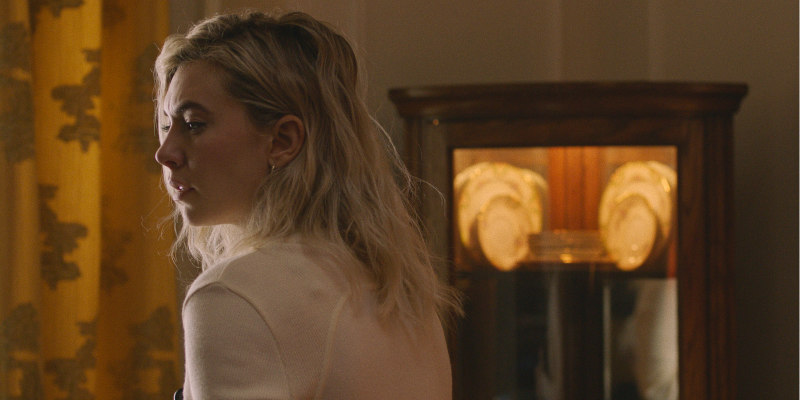
Review by
Eric Hillis
Directed by: Kornél Mundruczó
Starring: Vanessa Kirby, Shia LaBeouf, Ellen Burstyn, Molly Parker, Sarah Snook, Iliza Shlesinger, Benny Safdie,
Jimmie Fails

Orson Welles famously described Hollywood as "The biggest electric train
set any boy ever had." For decades, European filmmakers have emigrated to
Tinseltown, drawn by the lure of huge budgets and filmmaking on a scale they
could only have dreamed of in their home countries. It wasn't always so. In
the 1930s, a wave of filmmakers fleeing the rise of European fascism found
themselves working on a smaller scale in the US than they had in the film
industries of Central and Eastern Europe, which at the time rivalled
Hollywood.
There are parallels to this era in Kornél Mundruczó's first
dabbling in American filmmaking, Pieces of a Woman. It's hard to think of many recent Hollywood movies that rival the
Hungarian auteur's last two films,
White God
and
Jupiter's Moon, in terms of scale. If any modern European filmmaker seems like a natural
fit for Hollywood blockbusters, it's Mundruczó (and like his '30s
predecessors, he's likely left Hungary for political reasons). Hell, with
Jupiter's Moon, he's already made a superhero movie of sorts. It's odd then to see him
make an intimate character study as his English language debut.

There's little of the extravagance we've come to expect from the Hungarian
on display here, save that is for the bravura sequence that takes up the
opening quarter of his new film. In a couple of extended
takes, Mundruczó details Martha (Vanessa Kirby) going into
labour in her Boston home. Initially assisted solely by her partner Sean (Shia LaBeouf), Martha is joined by Eve (Molly Parker), a replacement for their
usual midwife, who is busy with a labour elsewhere. After complications,
their daughter is born, only to pass away within minutes.
It's a harrowing and effective setup for what ultimately plays out as a
shallow, directionless study of grief. You get the feeling Mundruczó
really wanted to film Pieces of a Woman's much talked about opening sequence, but couldn't find a story to justify
it. The remainder of the film is confounding in its hollowness, devoid of
insight into the psychological condition of its protagonists. Like a b-grade
Broken Circle Breakdown, Martha and Sean find themselves divided on philosophical grounds, with
the former wishing to donate their daughter's remains to science while the
latter, along with Martha's interfering mother Elizabeth (Ellen Burstyn), wants a full religious burial. While Martha wants to simply move on,
Sean and Elizabeth take legal action against Eve, who doesn't appear to have
done anything wrong. Yet the movie never really gets any dirt under its
fingernails in its half-assed exploration of such conflicts.

Pieces of a Woman plays out its drama through a series of
clichés and hammered home metaphors. If you've seen any movie about a
grieving mother, you've essentially already seen
Pieces of a Woman, as it has nothing to add to this sub-genre. Martha's grief is portrayed
lazily through stock scenes of her staring at children on public transport,
and of course that well worn trope of a troubled woman taking a bath. Sean
retreats into sex with Martha's lawyer cousin (Sarah Snook), a
dalliance thrown in cheaply to make us sneer at him, and one which I
couldn't buy into. That said, I never bought Martha and Sean as a couple
either. Nor could I accept the 88 year-old Burstyn as the mother of the
32-year-old Kirby.
The metaphors come thick and fast, with the film broken down into roughly
monthly chapters, each opening with a shot of two sides of an
under-construction bridge gradually inching towards each other. In the
film's cheapest moment, Burstyn launches into a monologue about escaping the
Holocaust. It's a well written and performed monologue mind you, but it
comes out of nowhere, like a desperately exploitative pitch for awards
glory.

Mundruczó famously made a movie with a canine protagonist, and that dog was
more human than any of the characters in his American debut. Kirby, LaBeouf
and Burstyn all shoot for the moon here, but they simply can't make anything
out of the hollow human husks they're saddled with. Kirby is unconvincing in
the role of grieving mother, looking absolutely fabulous throughout, not
even breaking a sweat during what is supposed to be a particularly intense
labour and losing every shred of her weight gain in a mere three
weeks.
Give Mundruczó the reins of the next Captain America movie and enough
freedom to express himself and he'll likely reinvigorate staid Hollywood
tentpole filmmaking with his arresting visual style. But telling the small,
intimate story of two people struggling with a personal loss is something
that requires a little more than impressive camera moves. In
Pieces of a Woman, the pieces never quite fit together to form a satisfying picture.


